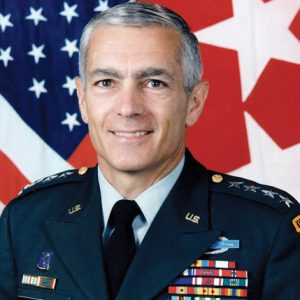calsfoundation@cals.org
Wesley Kanne Clark (1944–)
Wesley Kanne Clark is an Arkansas resident whose distinguished military career propelled him into the international spotlight. His consulting business, high-profile television commentary, and political aspirations sustain his involvement with the nation’s political leaders and processes. He obtained the rank of a four-star general during his military career and acted as the Supreme Allied Commander of NATO, Europe, from 1997 to 2000. During his first political race in 2004, he was a Democratic candidate for president of the United States. Although unsuccessful in that race, he ran an effective campaign and ultimately turned his support to John Kerry’s bid.
Wesley Kanne was born in Chicago, Illinois, on December 23, 1944, the only child of Venetta and Benjamin Kanne. His father, the son of Jewish immigrants, was a prosecutor, a veteran of World War I, and a Democratic politician. His mother was a homemaker. Wesley’s father died when Wesley was three years old.
After her husband’s death, Venetta Kanne moved her son to Little Rock (Pulaski County) to live with her parents. She worked at a local bank and eventually bought a house with her earnings and her deceased husband’s military service benefits. In 1954, when Wesley was nine, Venetta Kanne married Victor Clark. Victor Clark adopted Wesley, and his name was changed to Wesley Kanne Clark.
At Little Rock Hall High School, Clark was a founding member of the swim team and an exemplary student. He led their swim team to a state championship and graduated as the class valedictorian in 1962.
Clark was accepted into the U.S. Army Academy, West Point, when he was seventeen, in April 1962. His athletic and academic abilities made him a prominent student during his tenure there, and he ultimately graduated first in his class in June 1966.
As a result of his many accomplishments at West Point, Clark was awarded a Rhodes scholarship. He spent two years in England studying at Oxford University and obtained his master’s there in 1968 in philosophy, politics, and economics. He speaks four languages fluently—English, Spanish, German, and Russian.
Clark met Gertrude “Gert” Kingston, from Brooklyn, New York, at a dance he attended while a student at West Point. They married on June 24, 1967. Their only child, Wesley Jr., was born while Clark was serving in Vietnam.
From May 1969 until February 1970, Clark served in the Vietnam War. He was shot four times in February 1970 while on patrol as captain of his mechanized infantry company. Despite his wounds, he continued to command his unit and issued orders that successfully allowed his soldiers to overrun the enemy. Clark spent two weeks at a hospital in Vietnam and then returned to the United States for recovery. He was awarded the Bronze Star and Silver Star as a result of his performance under enemy fire and was given a Purple Heart for his injuries.
Clark’s military career involved multiple commands and spanned three decades. After Vietnam, he attended the Command and General Staff Officer Course, where he wrote a master’s thesis critical of air strikes in Vietnam that were influenced more by political decisions in Washington DC than by military planners in the middle of the action. He commanded battalions in Colorado and Germany and then acted as the commanding general of the U.S. Army’s National Training Center during the Persian Gulf War.
As the commanding general of the First Cavalry Division at Fort Hood, Texas, he conducted three emergency deployments to Kuwait. From 1994 to 1996, he acted as director of strategic plans and policy for the Joint Chiefs of Staff at the Pentagon. During his time there, he assisted with the development of an exit strategy for the 1994 invasion of Haiti. Clark then acted as the lead military negotiator for the Bosnian Peace Accords in 1995.
Clark’s final command was to serve as Supreme Allied Commander, Europe, from July 1997 to May 2000. He commanded all of the NATO military forces in Europe and led 60,000 troops from thirty-seven NATO and other nations in Bosnia-Herzegovina. This same position was held by Dwight D. Eisenhower before his retirement from the military and successful bid for the presidency.
Clark broke with the Pentagon during his role as Supreme Allied Commander, Europe. There has been speculation that his close alliance with the Clinton administration contributed to this resentment within the Pentagon. Also, Clark disregarded the Pentagon’s reluctance to consider publicly the use of ground forces to push the Serbs out of Kosovo during the bombing campaign and made public statements of their necessity. His retirement may have been the result of these actions. In 2000, President Bill Clinton honored Clark’s service to the nation and the world by awarding him the Presidential Medal of Freedom.
As a civilian in 2001, Clark published Waging Modern War: Bosnia, Kosovo, and the Future of Combat. The book examined the new realities of planning and fighting a war. It was well received and outstripped sales expectations.
In 2002, Clark met with affluent New York Democrats to discuss a presidential run. In 2003, a grassroots movement to promote Clark’s candidacy led to the founding of the website, DraftWesleyClark.com, by John Hlinko and Josh Margulies. Clark subsequently received more grassroots support via the site DraftClark2004.com, founded by a Political Action Committee formed to convince Clark to run.
He announced his first bid into politics from Little Rock on September 17, 2003, running for the 2004 Democratic presidential nomination. The Internet strategy was successful in raising money, but time for planning a run was limited. Clark was a centrist candidate who supported the pro-choice and affirmative action initiatives. He called for the repeal of the George W. Bush tax cuts and promoted a new national healthcare program and the restructuring of the “war on terrorism” through improved relationships with other countries.
Clark was the top Democratic candidate until a decision not to campaign in the Iowa caucus allowed Kerry the momentum to pull to the forefront, with Howard Dean close behind. Clark fell to third and took third in the New Hampshire primary. He was first in the Oklahoma primary, third in Tennessee, second in Arizona, and a remote third in Virginia. After defeat in the South, he stepped down from the race on February 11.
Clark’s second book, Winning Modern Wars: Iraq, Terrorism, and the American Empire, was published in 2004. This book, which analyzes the U.S. war strategy in Iraq and the battle against terrorism, includes scathing indictments of the Bush administration’s policies and war strategy. It sold well compared to similar books.
Clark is president and CEO of Wesley K. Clark and Associates, a consulting firm located in Little Rock, formed in March 2003. Clark also provides commentary to FOX News as a military and foreign affairs analyst. He previously provided commentary to CNN. He also serves on the board of directors of BNK Petroleum.
In June 2012, it was announced that Clark would host a reality show on the NBC network called Stars Earn Stripes, featuring celebrities performing military-style challenges. The show, which premiered in August 2012, lasted only four episodes. Clark’s wife, Gert, filed for divorce in 2012, though they later reconciled. Clark served as advisor to Victor Ponta, who served as Romania’s prime minister from 2012 to 2015. Clark is also vice chariman of the board and senior veterans advisor for the Grilled Cheese Truck Inc., a company that recruits veterans to run its franchises. Clark also founded a company named Energy Security Partners, which leased land near Pine Bluff (Jefferson County) to build a proposed $3 billion plant to convert natural gas to liquid fuel.
For additional information:
Clark, Wesley K. Don’t Wait for the Next War: A Strategy for American Growth and Global Leadership. New York: PublicAffairs, 2014.
———. A Time to Lead: For Honor, Duty and Country. New York: Palgrave Macmillan, 2007.
———. Waging Modern War: Bosnia, Kosovo and the Future of Combat. New York: Public Affairs Press, 2001.
———. Winning Modern Wars: Iraq, Terrorism, and the American Empire. New York, New York: Public Affairs Press, 2004.
Felix, Antonia. Wesley K. Clark: A Biography. New York: Newmarket Press, 2004.
Ellen E. Withers
Conway, Arkansas
 Wesley Clark Campaign Button
Wesley Clark Campaign Button  Wesley Clark
Wesley Clark  Clark for President CD
Clark for President CD  Clark Campaign Button
Clark Campaign Button 



Comments
No comments on this entry yet.